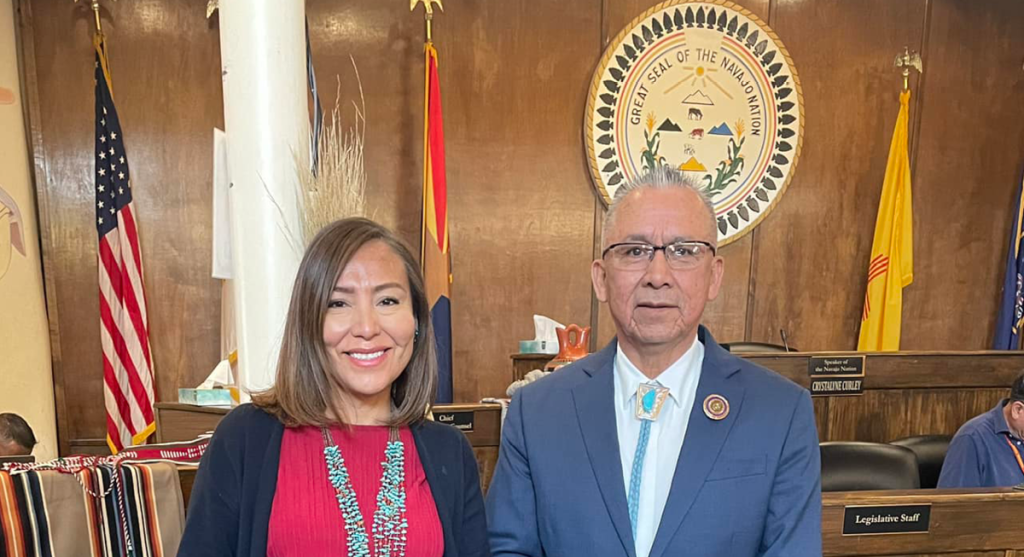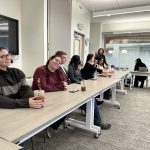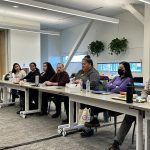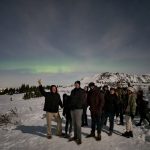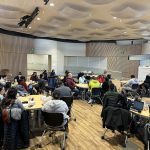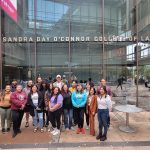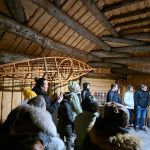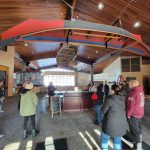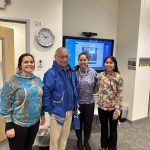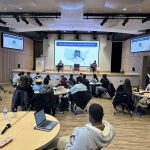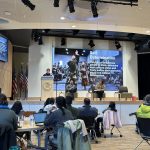Monthly Archives: April 2023
Student attorneys at Gila River

In January, Professor Patty Ferguson-Bohnee and the Indian Legal Clinic students Ashleigh Fixico (3L), Noah Goldenberg (3L), Kristina Major (2L) and Chanel Simon (3L) traveled to the Gila River Indian Community (GRIC) Courthouse in Sacaton, Arizona and observed arraignments in person. While at the court, the ILC student attorneys were sworn in to the Gila River Indian Community Court by Chief Judge Anthony Hill (’06). Judge Charles Aragon led an informative tour during which the students met other judges and staff.

After visiting the courthouse, the student attorneys visited the Gila River Prosecutor’s Office. Chief Prosecutor Voyles and Carleton Giff offered career advice and insight into a prosecutor’s role. ILP alum and prosecutor Dustin Rector (’21) demonstrated the art of a winning closing argument. ILC student attorneys work with the Gila River Prosecutor’s Office on traffic trials.
On March 7, Goldenberg successfully represented the Gila River Indian Community in a civil traffic trial.
“My experience working with GRIC is a great example of why ASU was the perfect school for me,” said Goldenberg. “I came to law school to study Indian law, with the hopes of working with tribes after graduation. I don’t know of many other opportunities where students have the opportunity to get real, live courtroom experience in tribal courts. I loved being able to work hands on. The whole point of clinic is taking what you have learned in law school and applying it in the real world. It is a unique opportunity and great honor to be able to do that with tribes. ASU Law produces talented Native attorneys, and this was one of the experiences that explains why. My advice to future clinic students is to volunteer and take every opportunity to work in tribal courts. It was an immense honor to contribute to tribal sovereignty and self-determination.”
The Indian Legal Clinic appreciates the Gila River Indian Community for providing clinic students formative career experiences.
____
Honore Callingham (’18)
Law Fellow, Indian Legal Clinic, ASU Law
ILP students compete in UCLA Moot Court
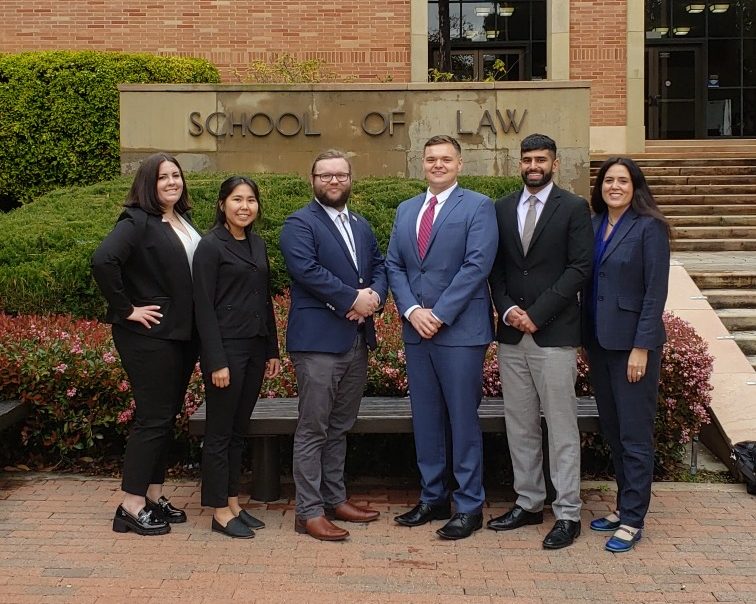
ILP students Chad Edwards (3L), Samir Grover (2L), Ryan Maxey (3L) and Chanel Simon (3L) competed in the UCLA Williams Institute Moot Court Competition. The competition is the only moot court competition dedicated exclusively to gender and sexuality that involved competitors from across the country. Students prepared an appellate brief on the constitutionality of a hypothetical ban on conversion therapy and gender affirming care under the first and fourteenth amendments. On March 11, ILP teams had the opportunity to argue both sides of the issue at UCLA.
“Being involved with a moot court competition provides a complementary experience to law school classes,” said Simon. “I would recommend future ILP and NALSA students to participate in the competition because it gives you the chance to apply your writing and public speaking skills, while also learning how to improve those skills with feedback from professors, classmates, and volunteer judges. Moot court competitions also provide the opportunity to travel and meet law students from across the country.”
Thank you to our coaches, Faculty Director Patty Ferguson-Bohnee and Native Vote Fellows Torey Dolan (’19) and Blair Tarman-Toner (’21), and volunteer judges for helping them prepare.
Water rights case discussion
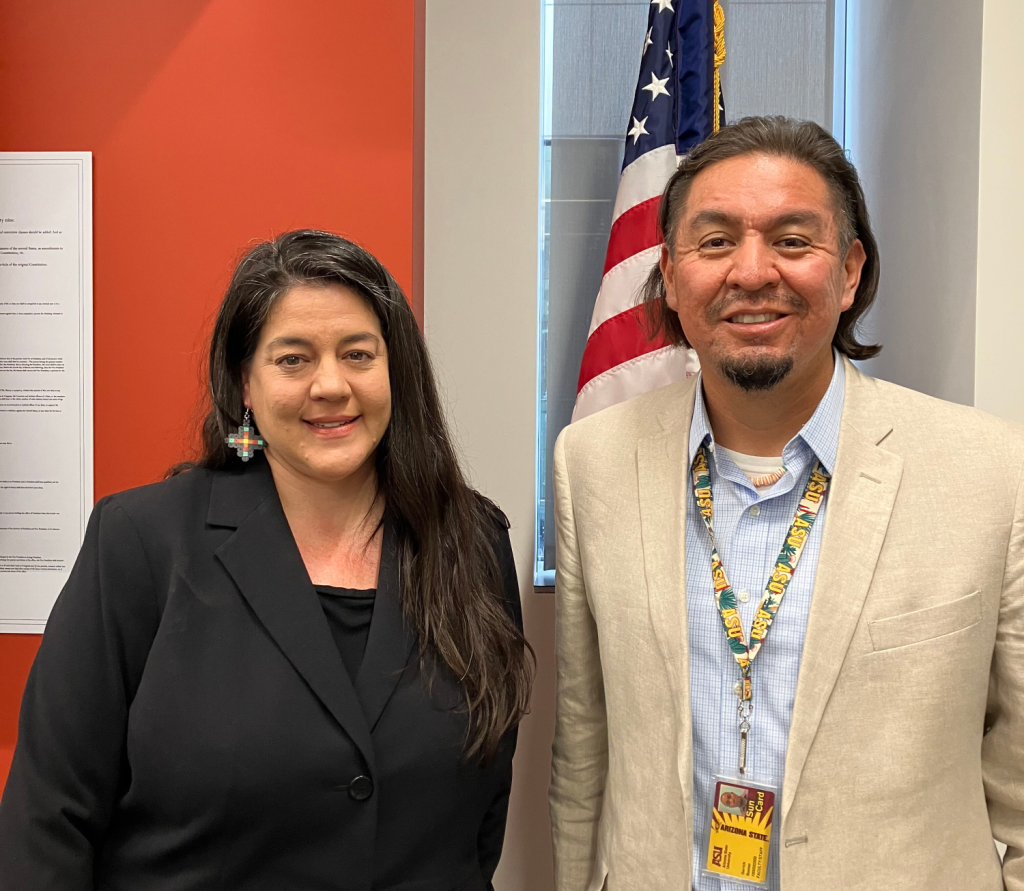
On March 14, NALSA and the American Constitution Society co-hosted a lecture discussion on the U.S. Supreme Court case Arizona v. Navajo Nation. Both Director Derrick Beetso (’10) and Heather Whiteman Runs Him, director of the Tribal Justice Clinic at the University of Arizona, worked with their respective teams and filed an amicus brief in support of the Supreme Court case.
Beetso and the Indian Legal Clinic recently filed an amicus brief on behalf of the Diné Hataałii Association. The brief gives a human identity because it gives an understanding of who the people are. Whiteman Runs Him, with her team, also filed an amicus brief that focuses on the United States v. Winters decision of 1908 on behalf of tribal governments, the National Congress of American Indians (NCAI), the Affiliated Tribes of Northwest Indians and the San Luis Rey Indian Water Authority.
Whiteman Runs Him explains the legal framework of the Winters case: “when the United States sets aside and reserves land for a permanent homeland for an Indian Tribe, like it did in the Treaty with the Navajo Nation, there’s an implied reservation of enough water, sufficient amount of water, to fulfill the purposes of that reservation. Based on that purpose for which the Navajo Nation reservation was set aside, there should be some affirmative duty on the U.S. to take meaningful actions to secure that water and bring that water to a point where the Navajo Nation can use it, rely on it and build on it. And that has not happened.”
Job opportunity: Deputy Attorney General
Picayune Rancheria of the Chukchansi Indians
Oakhurst, CA
The position of Deputy Attorney General shall be responsible for protecting all Tribal sovereignty and for providing legal advice and representation to all Tribal officials, agencies, departments, and branches of Picayune Rancheria of the Chukchansi Indians. The Deputy Attorney General will defend the integrity of the Tribe. The Deputy Attorney General is prohibited from offering individual legal advice or representing individual Tribal Members, but instead serves to protect the rights of all members of the Tribe by administering fair and impartial justice. Maintains confidentiality of all Tribal information.
See full job announcement: Deputy Attorney General
Job opportunities: San Manuel Band of Mission Indians
The San Manuel Band of Mission Indians is a federally recognized American Indian tribe whose Reservation and nationally-recognized resort casino are located in Highland, CA. We are excited to announce that our award-winning in-house legal department is hiring!
Our legal team plays an instrumental role in supporting the tribal government and business entities that sustain the government infrastructure. We are looking for individuals whose pursuit of excellence matches our own high level of expectations. For those candidates, we have several current opportunities to work in a collegial, team-oriented practice that supports one of the most successful Tribal gaming operations in North America as well as Tribal and business leaders pursuing some of the most forward-thinking initiatives and projects in Indian Country.
Current opportunities include:
- Staff Attorney – Government
- Staff Attorney – DEER (Development, Entitlements, Environmental, Real Estate)
- Legal Operations Specialist
- Managing Attorney – Complex Transactions (coming soon)
San Manuel offers competitive salaries and a comprehensive benefits package that includes: health and wellness plans, 401(k) matching, discretionary bonuses, and paid time off. If you seek a challenging and rewarding career in a fast-paced, dynamic environment responsible for preserving and protecting the interests of a Tribal government and its various business enterprises, now and into the future, we encourage you to learn more by clicking here. If you have any questions about roles, responsibilities, applications, or any other aspects, please feel free to reach out directly to our Executive Recruiter, Heather Nadeau, at heather.Nadeau@sanmanuel-nsn.gov .
Learning in Alaska
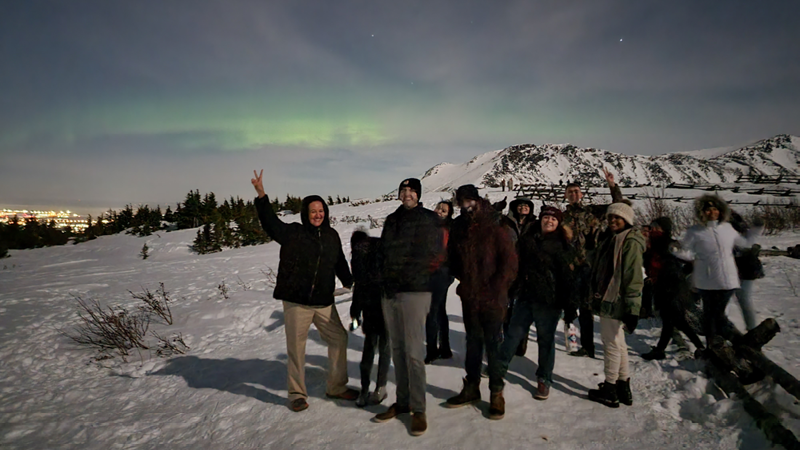
Partnership expands ILP Traveling Class
For spring break, 29 ASU Law students traveled to Anchorage, Alaska for the ILP traveling class Alaska Native Legal Issues and Solutions.
ASU Law and the Indian Legal Program (ILP) partnered with the Alaska Native Justice Center (ANJC) and the Cook Inlet Tribal Council, Inc. to offer this course. Alex Cleghorn, ANJC’s senior legal and policy director co-taught the class with Dean Stacy Leeds.
This week-long class exposed students to the culture, environment and unique legal issues of Alaska Native communities. Guest speakers, including ILP alumni Maude Blair (’02), Charlie Galbraith (’06) and Liz Medicine Crow (’05), presented on panels to share their insight and expertise. “What mostly resonated with me was applying a forward-looking approach to changing legislation instead of relying on legislative history to advocate for Native peoples,” said Maryam Salazar (2L).
On top of her course schedule and assignments, Ravynn Nothstine (3L) documented and shared her experience.
Read more in this ASU News article: Spring break trip to Alaska provides ASU students with firsthand look at Indigenous law
We appreciate our partners, hosts, presenters and alumni for making this an enriching experience. Thank you to our students, faculty and staff for documenting the first ILP traveling class in Alaska!
Addressing Arizona MMIP epidemic
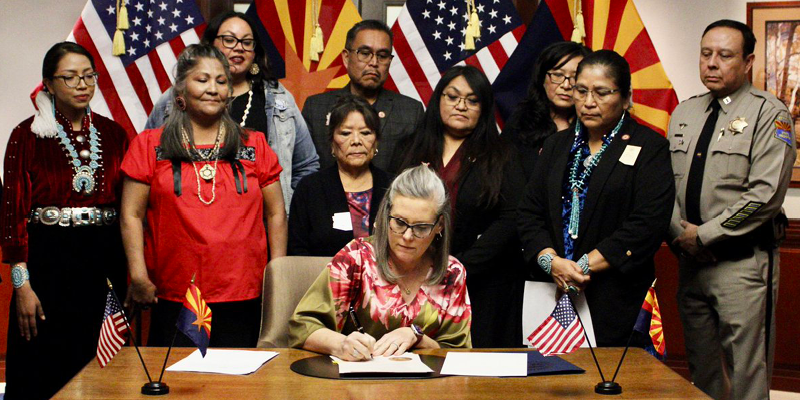
On March 7, Arizona Governor Katie Hobbs signed an executive order that established the Arizona Missing & Murdered Indigenous People study committee. Jasmine Blackwater-Nygren (’20), Navajo Nation First Lady, was appointed to the committee.
(Photo courtesy Arizona Mirror)

